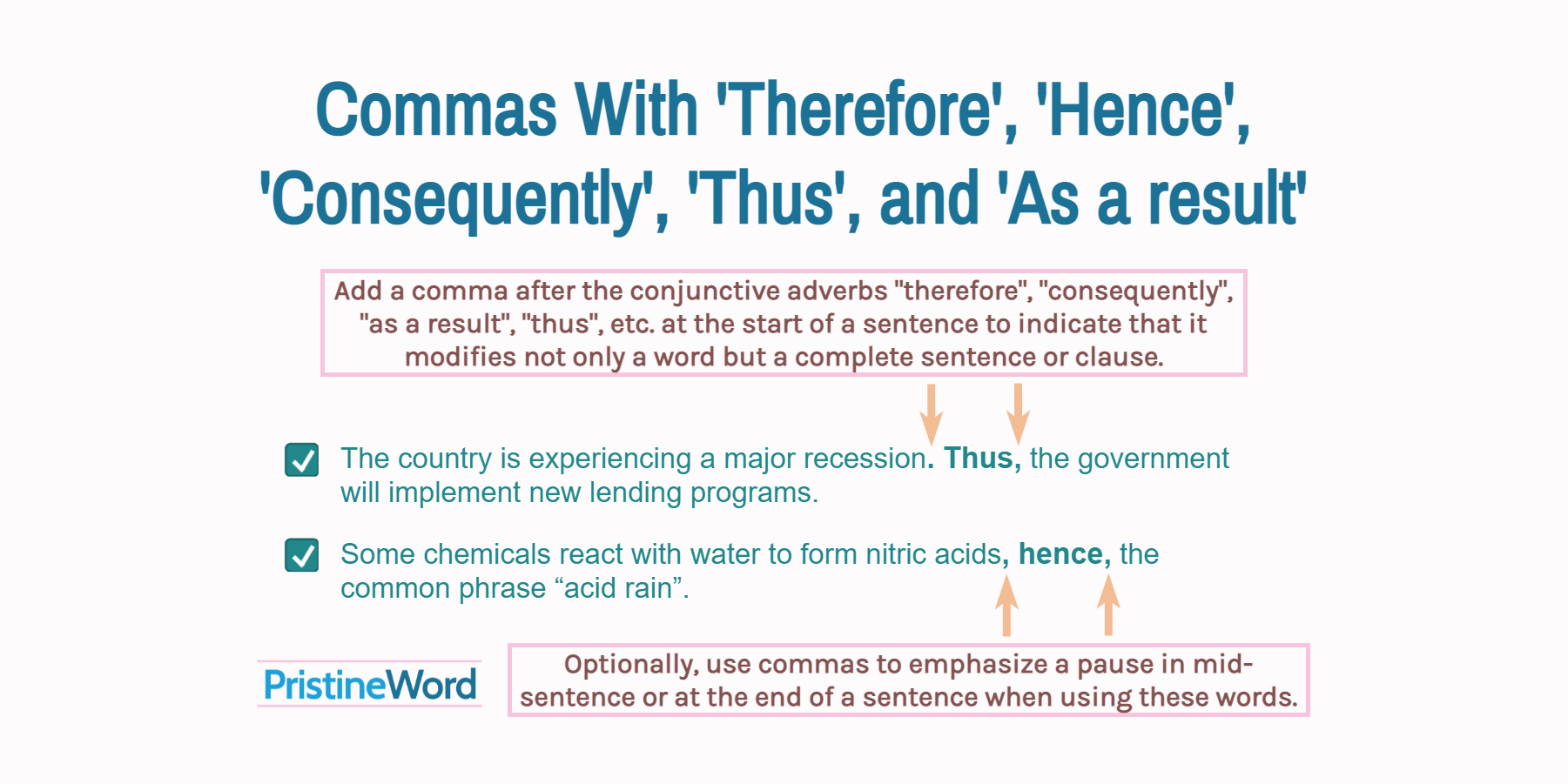Add a comma after the conjunctive adverbs "therefore", "consequently", "as a result", "thus", etc. at the start of a sentence to indicate that it modifies not only a word but a complete sentence or clause.
Add a comma after the conjunctive adverbs "therefore", "consequently", "as a result", "thus", etc. at the start of a sentence to indicate that they modify not a single word but a complete sentence or clause.
The country is experiencing a major recession. Thus, the government will implement new lending programs.
Optionally, use commas to emphasize a pause in mid-sentence or at the end of a sentence when using these words.
Research shows that sugar actually affects heart health. Some health organizations, consequently, recommend specific public policies to reduce sugary drink consumption in children.
Contents
1. How to Use 'Therefore', 'Consequently', etc.
We use expressions such as "therefore", "thus", "consequently", etc. to show that what is said follows logically from what was said before.
The business is experiencing a negative cash flow; therefore/thus/consequently/as a result, we decided to adjust the prices of our products.
1.1. Levels of formality
The main difference among these adverbs lies in their level of formality.
"Thus" and "hence" are mainly used in academic writing or very formal situations. Using these words in colloquial language is not recommended, since they may sound old-fashioned or snobby in this context.
The communication system protocol did not work properly, hence, the delayed response.
It is very hot, hence/thus, we could have a drink.
"Therefore", "consequently", and "as a result" are also formal but acceptable in a broader range of situations.
Many Africans suffer from droughts and a shortage of food. Therefore, international support to Africa should be one of our major priorities.
"Then" and "so" are commonly used in informal conversations and colloquial language.
I am hungry, so I will eat a hamburger.
1.2. Subtle differences in meaning
"Hence" means basically "from this" and can be used in written English to describe a close relationship between two clauses or phrases.
Some chemicals react with water to form nitric acids, hence, the common phrase “acid rain”.
"Therefore" and "thus" are often used to reach a conclusion; that is, we take the first statement as a truth, and because of that truth we reach a conclusion.
Olive oil contains significant amounts of antioxidants and has anti-inflammatory properties. Therefore, extra virgin olive oil provides beneficial nutrients for your body.
"Consequently" and "as a result" indicate a consequence rather than a conclusion.
These chairs are made by hand. Consequently, they are more expensive.
2. How to Use Punctuation Marks
When using "therefore", "consequently", or a similar word at the start of a sentence, add a comma after it.
Computer skills may help you find a better job. Therefore, you should familiarize yourself with an understanding of how the Internet works.
Instead of a period, we can use a semicolon to narrow the gap between two independent clauses.
The electric car was too expensive; consequently, they decided to buy a cheaper one.
"Consequently" can also act as a sentence adverb and should be set off with commas in this situation.
They will review the facts and, consequently, decide what to do.
When using these expressions in the middle of a sentence, you can use commas to stress the interruption.
That was a formal occasion. His casual clothes were, therefore, inappropriate.
Alternatively, you can skip the commas to introduce a weaker interruption.
John was early and as a result got the front seat.
But whether the interruption is slight or significant, never skip one comma and leave the other.
Employees have become frustrated with the company. Production rates, consequently have remained low.
Employees have become frustrated with the company. Production rates, consequently, have remained low.
Do not forget to add the closing comma (also called an appositive comma).
We can also use "therefore", "hence", "thus", "consequently", or "as a result" at the end of a sentence.
Commodity prices are falling. The emerging-market economies are at risk as a result.
Similarly, you can insert a comma before the adverb to emphasize at the end.
Saudi Arabia plans to increase its oil output. Oil prices could plummet, as a result.
Follow the same comma rules when using "so" or "then". For example:
- Olivia made a great effort, so she passed the exam.
- I am cold, so I'll put on multiple pairs of socks.
- I didn't like the meal; then, we let the waiter know as soon as possible and got something different.
- You said that Japanese is too hard, right? Then, practice more.

